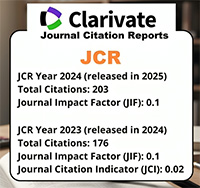The effects of curcumin on the biological behavior of colorectal cancer cells through the JAK/STAT3 and RAS/MAPK/NF-κB pathways.
Los efectos de la curcumina en el comportamiento biológico de las células del cáncer colorrectal mediante las vías JAK/STAT3 y RAS/MAPK/NF-KB.
Resumen
El objetivo del presente trabajo fue investigar los efectos de la curcumina en el comportamiento biológico de las células del cáncer colorrectal mediante el estudio de las vías JAK/STAT3 y RAS/MAPK/NF-KB. Las células del cáncer colorrectal humano HCT116 se cultivaron y dividieron en un grupo control y en grupos con dosis baja, media y alta (n = 5) de curcumina. Las células de cáncer colorrectal HCT116 se convirtieron en células de crecimiento prolongado después de la incubación y cultivo a 37°C. El grupo de control se trató con 15 μL de solución tampón fosfato salina (PBS) y los grupos de curcumina de dosis baja, media y alta se trataron con 20, 40 y 80 μmol/L de curcumina, respectivamente. Todos los grupos fueron tratados con la intervención farmacológica pertinente, digeridos y centrifugados durante 48 horas, lavados dos veces con solución de PBS, centrifugados a 1000 rpm durante 3 minutos, y las células precipitadas. Se observaron la proliferación, la apoptosis y el ciclo de crecimiento de las células de cada grupo, y fueron estudiados las expresiones de las vías JAK/STAT3, RAS/MAPK/NF-KB y proteínas relacionadas en cada grupo. Comparado con los grupos de la dosis baja y media de la curcumina, disminuyó obviamente la capacidad de proliferación del grupo de la dosis alta de la curcumina (P<0,05). Comparado con los grupos de la dosis baja y media de la curcumina, aumentó de modo significativo la capacidad de la apoptosis del grupo de la dosis alta de la curcumina (P<0,05). Comparado con los grupos de la curcumina de dosis baja y media, aumentó obviamente la proporción del crecimiento de la fase G0/G1 en el grupo de la curcumina de dosis alta y el porcentaje de la fase S disminuyó considerablemente (P<0,05). Las expresiones proteicas STAT3, RAS, P-P38 y P65 en el grupo de la dosis alta de la curcumina fueron evidentemente más bajas que las de los grupos de la dosis baja y media de la curcumina (P<0.05). La curcumina puede inhibir la expresión de las vías JAK/STAT3 y RAS/MAPK/NF-KB, bloquear el ciclo del crecimiento y luego inhibir la proliferación e inducir apoptosis de las células del cáncer colorrectal, lo que brinda una nueva idea para el tratamiento clínico del cáncer colorrectal.
Descargas
Citas
Arnold M, Sierra MS, Laversanne M, Soerjomataram I, Jemal A, Bray F. Global patterns and trends in colorectal cancer incidence and mortality. Gut 2017; 66(4):683-691.
Zhang Y, Hou Y, Zhang D. Effects of TYMP gene polymorphism on adjuvant chemotherapy after R0 resection in patients with colorectal cancer. Cancer Res 2018; 45(7): 5.
Chiu HC, Lin YC, Hsieh HM, Chen HP, Wang HL, Wang JY. The impact of complications on prolonged length of hospital stay after resection in colorectal cancer: A retrospective study of Taiwanese patients. J Int Med Res 2017; 45(2): 691-705.
Li XJ. Basic and clinical research and problems of curcumin in tumor therapy. Chinese J Pharmacol Toxicol 2019; 33(9): 2.
Zhang L, Pan H, Wang Y, Guo T, Liu L. Genome profiling revealed the activation of IL2RG/JAK3/STAT5 in peripheral T‑cell lymphoma expressing the ITK‑SYK fusion gene. Int J Oncol 2019; 55(5): 1077-1089.
Lu J, Fu X, Zhang JH, Chen H,Gao J, Fan J, Zhang Y. Changes of tumor necrosis factor -α/P38 mitogen-activated protein kinase/serum nuclear factor -κB/ retinol binding protein signaling pathway in ApoE gene knockout mice. Anhui Med Pharm J 2018; 22(7): 5. Barkovits K, Pfeiffer K, Eggers B, Marcus
K. Protein Quantification Using the “Rapid Western Blot” Approach. InQuantitative Methods in Proteomics 2021 (pp. 29-39). Humana, New York, NY.
Majtnerová P, Roušar T. An overview of apoptosis assays detecting DNA fragmentation. Molecular biology reports 2018 Oct;45(5):1469-1478.
National Clinical Research Center for Digestive Diseases (Shanghai), National Alliance of Centers for Prevention and Treatment of Early Gastrointestinal Cancer, Chinese Society of Digestive Endoscopy, Health Management Branch of Chinese Medical Association. A review of early colorectal cancer screening in China. National Med J China 2019; 99(38): 2961-2970. DOI: 10.3760/cma.j.is sn.0376-2491.2019.38.001.
Zhang H, You J, Liu W, Chen D, Zhang S, Wang X. The efficacy and safety of bevacizumab combined with FOLFOX regimen in the treatment of advanced colorectal cancer: A systematic review and meta-analysis. Medicine (Baltimore) 2021; 100(30). :e26714.
Li N, Wang XT, Jiang SH, Zhang SN, Wang D. Preparation and antitumor activity evaluation of curcumin precursor. China Coal Ind Med J 2017; 20(7): 3. DOI: 10.13422/j.cnki.syfjx.20181891.
Sun W. The effect of curcumin on the biological behavior of human thyroid cancer b- CPAP cells. Mod Oncol 2019; 27(2): 5.
Guo Y, Hua C, Yu X, Pei X, Li Y. Effects of curcumin on tPC-1 proliferation, apoptosis, migration and invasion of thyroid cancer cells by regulating Mir-152. J Guangxi Med Univ 2021; 38(7): 7.
Wu CS, Wu SY, Chen HC, Chu CA, Tang HH, Liu H SH, Hong Y, Huang CY, Huang GC, Su CL. Curcumin functions as a MEK inhibitor to induce a synthetic lethal effect on KRAS mutant colorectal cancer cells receiving targeted drug regorafenib. J Nutr Biochem 2019; 74: 108227.
Yang L, Hong L. Integrin β 1-fak-RAS-MAPK signal transduction pathway and its relationship with tumor. China Med Rev 2019; 16(30): 4.
Wu Z, Liu H, Sun W, Du Y, He W, Guo Sh, Chen L, Zhao Zh, Wang P, Liang H, Deng J. RNF180 mediates STAT3 activity by regulating the expression of RhoC via the proteasomal pathway in gastric cancer cells. Cell Death Dis 2020; 11(10): 1-11.
Liu LP, Hao JY, Pan H, Wang C, Yue P. Mutation of RAS gene in thyroid follicular differentiated tumor and its significance. Chinese J Pathol 2020; 49(3): 6.
Yu Peng, Yan S. Effects of simulated hypoxic microenvironment on invasion, migration and Ras/MAPK/NF-κB pathway of human gastric cancer cells. China Clin Res 2019; 32(7): 5.





















